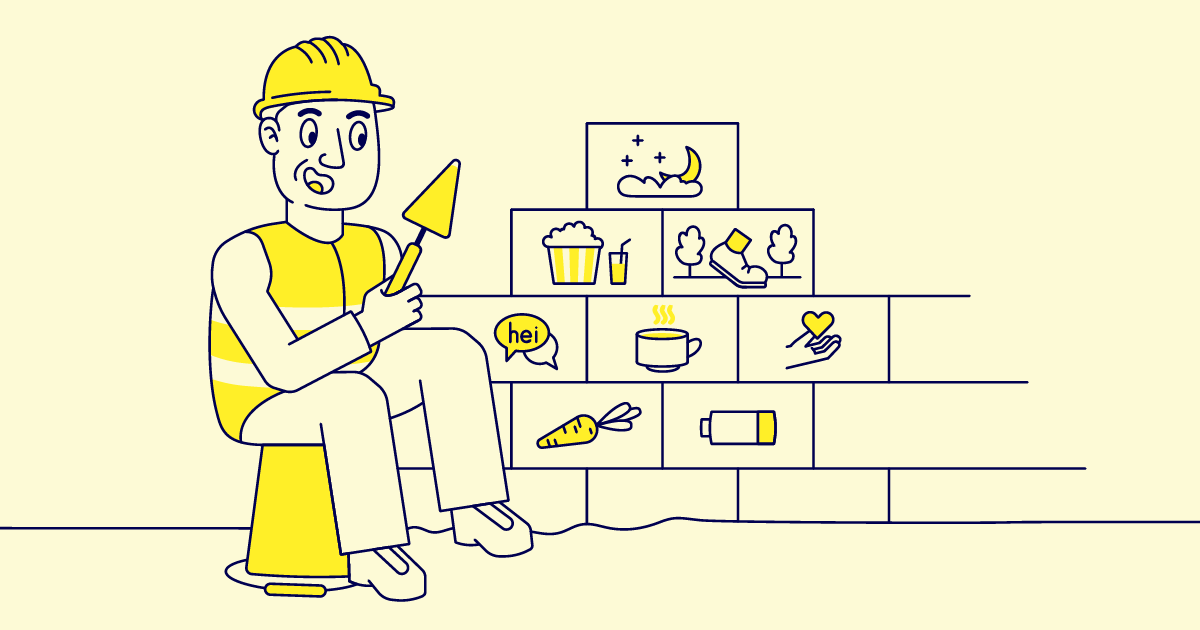Does your recovery mean sleeping in on the weekend? How are you doing right now if you think about the last two weeks? According to your own assessment, is your stress meter green, or is it screaming red because you haven’t been able to recover properly for a long time?
To put it simply, recovery is about giving ourselves time to recuperate physically and mentally.
Recovery and stress go hand in hand; you can't have one without the other. Your stress load contributes to your strength and your ability to adapt. When your stress load gets too high for too long, though, the limited resources you have for recovery aren’t enough. The most important thing is to find a balance between stress and recovery that suits you in your current life context.
To reiterate that important point: stress is a normal and necessary part of our lives. The goal is not a “stress free” experience. Everything we do, from work, to exercise, socialising, house chores and hobbies, contributes to our stress load.
However, we are not machines that can keep going hour after hour, day after day, without repercussion. Getting sick, for example, is just one possible symptom or inadequate recovery. Unfortunately, it doesn’t help if you spend all hours of the day doing only exciting and pleasant things. Positive activities create stress as well.
Recovery cannot be stored, either. For example, while it might seem to work for a while, you can’t actually build up “sleep debt” during the week and sleep it off over the weekend. Recovery must happen every day. When recovery is insufficient or skipped altogether, it eventually leads to overload, fatigue and reduction of general well-being. When you take care of recovery, you invest in your own stamina and health, quality of life, and your ability to perform well at work.

Assess your own stress level right now. All good or on the way up because you haven’t been able to recover properly for a long time?
The building blocks of recovery
Recovery is a comprehensive, physiological and mental process. When you become aware of and appreciate your own needs in their entirety, you ensure recovery. When you set enough limits on how you spend your days, you can reserve time for activities that support recovery. If you keep saying yes to everything, you're putting a damper on your body's recovery process.
The first building block of recovery is self-awareness. Increasing your self-awareness is an important tool for supporting recovery. What stresses you out? When do you feel most at ease? Do you notice when your body goes into overdrive and needs calming? What is so immersive that you don’t think about anything else at all? Do you notice when you get to the point that you need a friend or colleague to intervene and help you out?
The importance of sleep and breaks in recovery
Did you go to bed too late again, with your cell phone next to your pillow? Sleep is a necessary process for restoring vital functions and alertness. An essential building block of recovery, sleep restores us not only from physical but also cognitive stress load.
A relatively steady daily sleep rhythm is the most optimal for recovery. Not all sleep is equal. You need to invest in sufficient relaxation before sleep and to reduce the body's activity level. Just like children, adults need soothing routines not only to fall asleep, but ensure good, quality sleep.
Breaks, another building block of recovery, are like pieces of good sleep during the day. A suitable break from work helps us cope and affects the choices we make after the work day. If the body and mind have been buzzing in circles throughout the day without these moments of rest and recovery, we can reach overload before the day is over. By the end of the workday, our resources are no longer enough for exercising, or playing with the kids, or forgetting about the tasks at work you still need to finish.
Take a break as a break: particularly for knowledge workers, switching from the computer screen to the phone screen is not exactly a break. If you are sitting all the time at work, going to the cafeteria to sit for a cup of coffee isn’t a break, nor is hanging out in the hallway if you are standing at the production line all day.
The point of a break is as the name suggests. Do something different and break from the norm. If you are at the desk all day, your break could be a short walk or stretching session. Think of your breaks this way: they should activate the parts of you that were at rest, while resting the parts that were active. Breaks with co-workers to talk about things other than work can also be revitalising and renewing for the mind. If you are staring at a screen all the time, going outside to just widen your gaze helps your eyes and mind relax for a bit.
Exercise to recover
Exercise is a key element of recovery, but this building block is a bit trickier than the others. Exercise has many positive effects in terms of recovery. In particular, good endurance and oxygen uptake contribute to high-quality recovery during sleep. Exercise deepens sleep, shortens the time it takes to fall asleep at night, and improves daytime alertness. If you take care of your physical health, recovery from everyday stress is faster and better.
Overexercising has the opposite effect. Excessive exercise can add too much to your body’s stress load and hinder recovery. For exercise to help recovery, it should be regular and, critically, suitable for your current fitness level. If this kind of exercise is something you really enjoy, all the better!
An overburdened mind and body do not always need complete rest or high-intensity training. Exercise can be any physical activity. Find rejuvenating activities on the golden middle path that suit you, whether it's walking in nature while enjoying the fresh air or feeling the burn at the gym.
The individuality of recovery - what do you enjoy?
Everyone needs high-quality sleep, breaks, good nutrition and regular exercise. However, the ways to relax and recharge our batteries can be very different from one person to the next. You need to find methods for each recovery building block that do not strain the same psychophysical system as your daily stress-building activities. Often that means "something completely different" than what we do during the work day.
The best methods are something you like, giving yourself positive reinforcement to properly recover every day. One enjoys knitting and another relaxes better by watching a movie.
It is important that the method of recovery you choose helps you to disconnect from work, calms the body and mind, and promotes quality sleep. And, it's just nice and meaningful for you! Remember, recovery does not only mean physical rest, but it can also be achieved through learning new skills, honing existing skills, and generally being active.
We need recovery moments hourly, daily, weekly and monthly. Finding the right recovery methods for you may not be a matter of adopting new behaviours, but rather letting go of old ones. If, after a work week full of twists and turns, you have a weekend ahead packed with household chores and general hurry, your resources will surely run out.
Take a critical look at your own standards and expectations. Maybe they are unnecessarily adding to your stress load. Do you always need to be productive? Does everything always need to be done at a certain time, or could, for instance, the cleaning be left for another day? Recovery can also be about learning how to let yourself "just be" sometimes.
The individuality of recovery - what do you enjoy?
Address your stress now!
In the midst of the rush, we often need more rest time. However, under the heaviest stress load, we often develop tunnel vision. We make choices on autopilot that seem to help in the short term, but which in the long term worsen recovery.
Such choices include, for example, not taking any breaks, resorting to alcohol to unwind after a hard day, and cutting back on sleep during the week. For this reason, it is good to pay attention to each of the building blocks of recovery as preventive measures.
Even if you live a steady and seemingly uneventful everyday life, recovery matters. What is your main recovery strategy right now? How do you reserve yourself enough recovery today? What about this week?
In Auntie's Stressed Out and Sleepless in Seattle packages, you can talk to a professional about your recovery and adopt new, good habits.
Writer:

Hanna-Kaisa Raninen
Hanna-Kaisa Raninen is a mental coach who holds a Master’s degree in Sport and Exercise Psychology and has two MBAs. In her work as Auntie-professional, Hanna-Kaisa helps her clients with stress management, self-management, better sleep and overall well-being. For Hanna-Kaisa, a client-based, empathetic approach and listening with curiosity are important to help the client find and develop their strengths.





